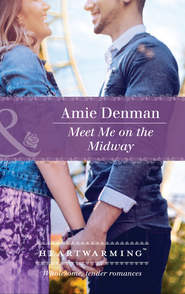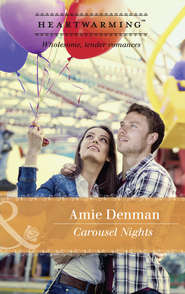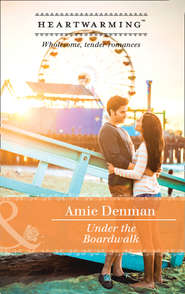По всем вопросам обращайтесь на: info@litportal.ru
(©) 2003-2025.
✖
Back To The Lake Breeze Hotel
Автор
Год написания книги
2019
Настройки чтения
Размер шрифта
Высота строк
Поля
“Shelly’s mother hasn’t learned to like me yet,” Bob said. “Maybe next year. In the meantime, how about letting us inside the haunted house?”
Alice shook her head. “Sorry, we want to keep some surprises for our guests.”
“We’ll walk with you as far as the arcade,” Nate said. He flashed a smile at the reporters. “But we’ll have to behave ourselves and not crash the party. There’s plenty of time for going through the haunted house when it opens.”
The group of six started walking in a disorganized blob. She wanted to walk between the two men from the haunted house company so she could talk freely with them as she had been for the past hour or so. But she didn’t dare tell the Bayside Times to put their cameras and notebooks away and head home, no matter how much she wanted to.
At the steps of the Western Arcade, she conceded to smiling for a picture with the haunted house producers. Now would they go?
“You might just see yourself in tomorrow’s paper,” the photographer said congenially. “But it sure would be a better picture if you were inside and we got a glimpse of something scary.”
Alice laughed, but then she noticed Nate’s expression as he stood behind the reporters. His usual pleasant, polite PR man veneer had been wiped off as if someone used an eraser on a chalkboard. He swallowed hard and glared at her.
Was he possessive about the news that came out of Starlight Point, or did a picture giving her credit for the fall events burn his biscuits that badly?
CHAPTER FOUR (#ulink_5cd152fc-720f-5efe-baba-77a2f2b0f53f)
THE NEXT DAY’S newspaper was on Alice’s doorstep by seven in the morning. The doorstep actually belonged to her parents, whose house she still lived in. Alice had been a year-round employee at Starlight Point for two years after working her way up to the coveted position by many summers of seasonal employment. Waiting tables in the off-season hadn’t been profitable, but she’d gotten by and taken pride in paying back her own student loans.
She might even have afforded her own place, but she’d been meticulously putting aside a portion of her paycheck every month to repay her parents for the wedding she’d called off the night before it happened. They had already paid for the flowers, the church, the reception facility, the band, the dress and the cake. How had she let them and herself get so carried away and run up such a giant bill? Maybe she wouldn’t be regretting the thousands of dollars spent if she’d gone through with the wedding.
In a few more months, she could surprise her parents by repaying the entire cost of disappointing them in one fell swoop. Then, at twenty-seven, she could finally get her own place, wonderfully free of the past.
She grabbed the paper from the same patch of front porch it had been thrown on by a succession of paper carriers all her life. She had about five minutes to glance through it before her father would ask for the paper with his coffee. And she knew better than to wrinkle it or mix up the sections. Her older sister had never cared to read the paper, but her younger sister had a habit of turning the sections inside out as she read them, a quirk that had spurred at least one family squabble.
She scanned the front page and was not surprised to see a big article about the fall festival weekends, which opened in a few hours. There were three pictures. One photograph of the front gate with its clever decorations, most of which had been her idea. One picture of the giant inflatable pumpkin where the midway fountain usually spewed water all summer. The massive balloon children could run through was also her idea. The third image was of a building on the Western Trail adorned with spiderwebs and bats. No pictures of Alice or anyone else.
“Is the paper here?” her father called from the kitchen.
I’ve got to get my own subscription, she thought. She resolved to read the article online as soon as she got to her office.
An hour later, Alice was glued to her laptop screen, skimming the article and hoping—vain though it was—to see a glimpse of her name, just so she could revel in the feeling of doing something right.
“Come on,” she said. She scrolled past an obnoxious flashing ad and kept reading to the end of the piece. Her shoulders fell. There was no mention of her in the article. Despite her hard work, imagination and planning. Despite the fact she had personally helped inflate that stupid pumpkin balloon.
“You don’t look happy,” Haley said. She put a cup of coffee on Alice’s desk. “It’s from Augusta’s bakery. I got you the good stuff because it’s opening day for the fall festivals.”
“Thank you,” Alice said. She still continued to skim the article, hoping she’d just missed it.
“Is something not going well?”
Alice shook her head. “Everything’s going fine with the opening, I think. It’s something else.”
Haley stepped around Alice’s desk and looked at her computer screen. “I saw that article in the paper while I waited for the coffee to brew at Augusta’s. I tried reading it to distract myself from getting a doughnut. My strategy failed, but the article seems like great publicity.”
“For Starlight Point, yes.”
Haley raised an eye brow and waited.
Alice sighed. “Sorry. Yes, it’s good PR for the Point. I just hoped... It’s silly—”
“They didn’t even mention your name after all the work you did.”
“You noticed that, too.”
“I did. I guess it’s good that the attitude around here is all for one and one for all, isn’t it?” Haley sat on the edge of Alice’s desk. “Why do you think your name wasn’t mentioned? It’s obvious the Hamiltons really like and value your work.”
“They didn’t interview me or the Hamiltons. Only one person contributed to that article.”
“Nate,” Haley said. She cocked her head as if trying to figure something out.
Alice nodded. “I’m taking this way too personally,” she said.
“Does Nate have something against you?”
Alice hesitated. “The short answer to that question is yes. The long answer is something I’d rather not talk about.”
Haley raised both eyebrows. “Must be a good story there.”
“More like a cautionary tale,” Alice replied.
* * *
EIGHT HOURS LATER, Nate checked his watch, hoping the weekend event would start on time. During the fall festival weekends, the park would be open Friday evenings and all day Saturday and Sunday. As the sun slanted across the sprawling parking lot at five o’clock on Friday, a sizable crowd gathered outside the front gate. Most of them wore jeans and sweatshirts as the September evenings already had the chill of fall.
Nate stood beside Virginia and Henry—keeping them between him and Alice. In the few weeks he’d worked at Starlight Point, Nate had discovered Henry was a good friend. Most of Nate’s friends had moved away from the area, and even though he’d come home to be an anchor for his dad, Nate felt he was drifting.
Jack, June and Evie Hamilton shared a microphone at the front gate and each of them said a few words about the extended season. Jack pointed to Alice who was standing only a few feet away and publicly thanked her for being the mastermind behind the fall weekends. She blushed and gave a little wave to the crowd. Her pink jacket made her stand out in the small crowd of year-round employees who were being recognized—mostly department heads and art and design staff.
A group of performers plucked from the singers and musicians in live shows—those who hadn’t yet gone back to college—performed the national anthem, and then the turnstiles opened.
“We did it,” June said as she came over to Alice and Virginia. Guests poured through the front gates behind her. “I know your hard work is going to pay off.”
Nate watched June hug Alice and then her mother. He felt a twinge of guilt that he’d asked the reporter to leave Alice’s name out of the article and not include the picture of her with the haunted house designers. He’d made up a story about Starlight Point wanting to recognize the team effort, not an individual’s. But that wasn’t his real reason.
The last thing his father needed as he battled cancer was to imagine his son was revisiting a dark period in his past. Even if that past was long over.
“Quite an event,” Henry said. “Exciting.”
“The first of many if it all goes well.”
Henry leaned on a post and regarded Nate. “Think you’ll be around for all those?”
“I’ll be around as long as I need to be.” The first of many cancer treatments had begun only days before, and Nate already saw the long road stretching out before him. Although his sister wanted to help, she had a young family and a job an hour away from Bayside. Nate was the obvious and willing choice for helping his dad get through the second worst experience of his life.
“You’re a good son, coming home to help your father through a rough patch.”
“He’s the only parent I have,” Nate said, and then he caught himself. What made him reveal something so personal to a man he hardly knew? Even in his own family, Nate never talked about his mother’s accident anymore. He cleared his throat. “How did you know I was...uh...helping my dad?”










